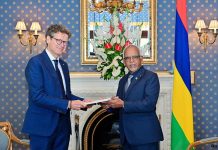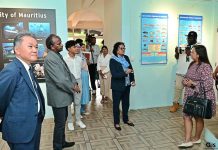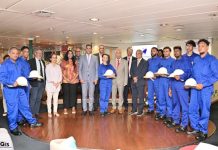Africa-Press – Mauritius. A Consultative Workshop focusing on “Plastic-Free Mauritius: Defining the Roadmap”, aimed at raising awareness on the various measures, regulations, policies and institutional framework to control plastic pollution, opened this morning at the Caudan Arts Centre, in Port-Louis.
The Minister of Environment, Solid Waste Management and Climate Change, Mr Kavydass Ramano, the United Nations Development Programme’s (UNDP) Resident Representative for Mauritius and Seychelles, Ms Amanda Serumaga, the Ambassador and Head of the European Delegation to Mauritius, Mr Vincent Degert, and other personalities were present.
The two-day event, organised by the Ministry of Environment, Solid Waste Management and Climate Change in collaboration with the UNDP Country Office, is in line with the Government Programme 2020-2024 in making Mauritius a plastic-free country within the nearest possible delays.
The Minister proceed with the launching of a video and posters on plastic and a report on ‘Optimising Private Sector Investment in Circular Economy to Facilitate Post-COVID Recovery in Mauritius’.
In his address, Mr Ramano highlighted that Government is striving to make of Mauritius a country which is plastic-free. Government Programme 2020-2024, he underscored, clearly stipulates the commitment of the authorities to adopt a policy which favours responsible development and which is ecologically sustainable.
Following the Assises de L’Environnement in December 2019, he recalled, during which major environmental issues were raised by public-private sector stakeholders, the Ministry introduced regulatory measures aimed at partially addressing the problem of plastic pollution through prevention namely the promulgation of new recommendation on the single use plastic in July 2020 and the promulgation of regulation on the protection of environment in September 2020.
The Minister also spoke of the vulnerability of the agriculture and fisheries sectors with regards to plastic and underlined that this will weigh down on the health of future generations.
As we all know, plastic pollution is a threat which has taken an international dimension and over the years, pressure has been accentuated for the signature of a global treaty at the level of Europe and Africa, he observed.
Locally, we manage around 70 000 tons of plastic wastes each year which represent 500kg per person on a yearly basis, he indicated. Unfortunately, most of these wastes end up at the Mare-Chicose landfill and only 3000 tons of the wastes are recycled each year locally or through exportation, he said.
We have to recognise that plastic recycling is not easy as most plastics are not made to be recycled due to the presence of additives, he added. According to him, when plastic eludes the value chain its sustainability becomes an environmental handicap and on the global front, an increase of 40% of plastic production by 2025, is expected.
It is estimated that there are around five billion of macro and micro plastic fragments in the oceans weighing up to 269 000 tons and more than one million seabirds and 100 000 marine animals die each year due to plastic pollution, he stated. For her part, Ms Serumaga recalled that plastic pollution has become one of the most pressing environmental issues.
The fast-increasing production of disposal plastic products overwhelms the world’s ability to deal with them with devastating effects across most Small Island Developing States given their high vulnerabilities to destructions of nature, she indicated.
One way to address the situation is to reimagine ways in general as resource of giving each waste as many lives as possible in the production cycle, she added.
She further announced that Mauritius has been selected to receive USD 200,000 from the UNDP small grants innovation programme on plastics which aims to boost innovation solutions to plastic pollution.
As for Ambassador Degert, he pointed out that the frenetic and uncontrollable production of plastic represents a growing threat for each one of us and we are all exposed.
The impact of plastic on land and marine ecosystem is enormous, he said. He moreover referred to alarming figures and noted that 400 million tons of plastic are produced yearly, that is, 25 times more plastics are produced than 60 years ago.
He further indicated that out of the 400 million tons, 75% that is 300 million become wastes and only 9% are recycled, 12% incinerated and the major part, that is 79%, are dumped in landfills and in worse cases in nature or in the sea, and 13 million tons of waste of plastics are discarded each year in the oceans.
The workshop is providing a forum for national dialogue among key stakeholders to forge the way towards the elaboration of a roadmap towards making Mauritius a plastic-free country.
The objectives are to expose participants to the insights of the vision of Government towards a circular plastic economy; seek feedback on the various measures in place and take stock of the gaps identified; and take on board the views of key stakeholders and their recommendations for the development of the roadmap towards a plastic-free Mauritius.
Launching of an Expo-Vente at L’Allée des Artistes and La Place du Caudan
Following the opening ceremony of the Consultative Workshop, Minister Ramano proceeded with the launching of an Expo-Vente at L’Allée des Artistes and La Place du Caudan at the Caudan Waterfront.
This expo-vente is expected to sensitise the public on plastic products that have been banned under the Environment Protection (Control of Single Use Plastic Products) Regulations 2020 and the Environment Protection (Banning of Plastic Bags) Regulations 2020, and on eco-friendly alternatives available on the market.
Around 30 exhibitors comprising SMEs and Cooperative Societies as well as other local producers, manufacturers, importers and recyclers are showcasing and promoting eco-friendly, biodegradable and compostable alternatives such as biodegradable tableware (plates, bowls, cups, cutlery); biodegradables plastic straws; biodegradable and compostable food containers; reusable plastic containers; and paper, textile, jute and pandanus (“vacoas”) bags.







